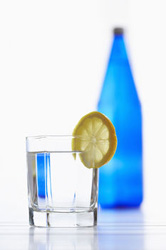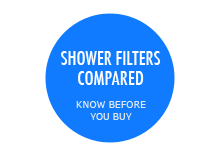Confused About Which Water is Best? A Necessary Guide of Six Types of Water and Which is Best for Your Health
by www.SixWise.com
Adults lose over 10 cups of water daily, just from sweating, eliminating waste, breathing and other routine functions. If you exercise, mow the lawn or do any other taxing physical activity, you’ll use up even more.
|

Your family deserves pure water for optimal health … but contrary to popular belief, the best water does not typically come out of a bottle.
|
If you don’t replenish your body’s water stores your body will begin to dry out, and this is a scenario you definitely want to avoid. Water is crucial for survival -- it's the base of all your body fluids, like blood and digestive juices, it helps nutrients from your food get absorbed and be transported, and it helps eliminate waste.
Even becoming mildly dehydrated (when you lose as little as 1 percent to 2 percent of your body weight) can seriously impact your body's ability to function.
But in today’s modern world, reaching for a glass of water to stay hydrated is not always a simple decision because there are so many types to choose from. If you’re like many people, you may be wondering which types of water are actually best.
Sorting through this information can be confusing, so we’ve compiled a straightforward guide to help you choose the very best water for you and your family.
1. Tap Water: Inexpensive but May Contain Some Undesirable Additives
Tap water is inexpensive and monitored to meet federal safety standards. However, it typically also has chlorine and its related disinfection byproducts, which have been linked to cancer and injury to the brain, nerves, liver, kidneys, eyes and reproductive systems. Most tap water in the United States also contains added fluoride, which many say can be a health hazard when ingested, leading to brittle bones, skeletal fluorosis and hypothyroidism.
Other contaminants that commonly exist in tap water include pharmaceuticals, pesticides and trichloroethylene, or TCE, a cancer-causing solvent with a fairly sweet odor and taste used in adhesives, paint and spot removers, and also to remove grease from metal airplane parts and clean fuel lines at missile sites.
2. Bottled Water: Expensive, Contains Potentially Contaminated Water and Plastics Chemicals AND Environmentally Hazardous
Many people think bottled water is safer than tap water, however drinking bottled water may pose a risk to your health. To start, bottled water is regulated by the Food and Drug Administration (FDA), which has weaker regulations than the Environmental Protection Agency requires for tap water. While tap water is not allowed to contain any E. coli or fecal coliform, for instance, bottled water is allowed some contamination.
Even bottled water that is regulated may still be contaminated. The Sierra Club reports that the National Resources Defense Council (NRDC) tested 103 brands of bottled water and found contamination exceeding allowable limits in about one-third of the brands, including toxins such as arsenic, synthetic organics and bacteria.
As we pay from 240 to 5,000 times more for bottled water than tap water (no wonder Americans spend about $11 billion on bottled water every year, according to the Beverage Marketing Corp.), it may irk you to know that the NRDC found that about one-fourth of bottled water is actually bottled tap water (some say it's as much as 40 percent). And just because a bottled water is labeled "Spring," "Pure," or "from a pristine source," doesn't mean it is.
The NRDC found one bottle labeled "Spring Water" that was actually from an industrial parking lot next to a hazardous waste site.
Further, bisphenol-A (BPA) is a chemical widely used to manufacture plastic water bottles. The chemical is capable of leaching from the plastic into the water you drink, and it's known that both heat and age increase the leaching of chemicals from the plastic.
This is concerning because BPA mimics the female hormone estrogen, impacting fertility, reproductive health and potentially promoting cancer. Recent studies also linked BPA to heart disease, diabetes and liver problems. What's worse is that chronic exposure to very low levels of BPA, such as might occur when drinking bottled water, is potentially very harmful.
Bottled water also generates vast amounts of waste. In the United States, more than 30 billion plastic water bottles are thrown away each year, and most are not recycled. A plastic bottle can take up to 1,000 years to decompose, and as a result of all of the plastic waste there is now a massive patch of garbage called the "Eastern Garbage Patch" floating in the Pacific Ocean. In fact, 90 percent of all floating marine litter is plastic.
Meanwhile, in order to produce the bottled water consumed by the United States in 2006 it required the equivalent of more than 17 million barrels of oil, according to the Pacific Institute. When you add in the energy it takes to transport the water to bottling plants, then transport the bottles to stores, your home and ultimately landfills, it equals filling a plastic bottle one quarter full of oil!
3. Reverse Osmosis Water: Removes Some Contaminants, but Stripped of Beneficial Minerals and Very Inefficient
Reverse osmosis (RO) is a type of water filter used to remove inorganic contaminants from household water supplies. On the plus side, RO filters will remove fluoride from your drinking water, which many other filters will not. However, RO is so efficient at removing compounds from your water that it also removes all minerals, producing essentially mineral-free water.
This is not ideal because some minerals in your water are healthy and essential to your body.
|
Purify Your Water Without Breaking the Bank … The Ultimate Kitchen Filtration and Enhancement System

The Wellness Kitchen combines the best filtration and enhancement technologies to deliver the purest and most natural tasting water available. It effectively reduces harmful contaminants, while at the same time enhancing the water with delicate ions and minerals.
Find out for yourself why hundreds of thousands of users including physicians, athletes and health-conscious individuals make the Wellness Water Filtration and Enhancement Systems their choice for a lifetime.
|
At the same time, chemicals like pesticides, herbicides, and chlorine, which are molecularly smaller than water, will not be removed by an RO filter unless a carbon filter is used along with it.
Further, household RO filters generate only about two to 10 gallons of cleaned water per day, but waste three or more times the amount of water treated, making them far less than efficient.
4. Distilled Water: Contains No Beneficial Minerals, Inefficient and Does Not Remove All Synthetic Chemicals
The distillation process is very effective at removing bacteria, viruses and heavy metals from drinking water. However, distillation does not remove synthetic chemicals like pesticides, herbicides and chlorine solutions.
Distillation also requires a heated energy source and requires five gallons of tap water to generate one gallon of purified water.
Also of concern, as with RO water, is that distillation strips water of natural trace minerals that your body needs.
5. Mineral Water: Healthy Water at a Price
By definition, mineral water must contain at least 250 parts per million of naturally present minerals at the point of emergence from the source (no minerals can be added later). Many claim that drinking mineral water offers health benefits similar to taking a vitamin mineral supplement, however it’s rather pricey to use as your sole water source.
6. Carbon and Multimedia Filtered Water: The Purest Water You Can Get, Efficient -- and at the Best Price
Filtering your water using carbon block technology builds upon both RO and distillation techniques, offering many of the same benefits while removing additional water contaminants. Further, they waste little water and require no heat source.
One such filter, which Sixwise.com highly recommends is the Wellness Kitchen S-III: The Ultimate Kitchen Filtration and Enhancement System.
The Kitchen S-III features a cartridge system that contains the best available carbon block technology. The carbon cartridges filter the water before and after the permanent volcanic enhancement media layers.
The Wellness Kitchen combines the best filtration and enhancement technologies to deliver the purest and most natural tasting water available. It effectively reduces harmful contaminants, while at the same time enhancing the water with adding important yet delicate wellness "ions and minerals" that your body needs.
The S-III reduces chlorine, chloramines, trihalomethanes, volatile organic compounds, pesticides, herbicides, and foreign tastes and odors below detectable levels for safer, healthier water. An LED display tells you exactly how much life is left in your cartridges, making it easy to know when it is time to replace them. The S-III also uses a unique quick-fit connector, which makes installation an easy 3-minute operation -- no plumbing required.
Further, filtering your own tap water costs about 31 cents a gallon -- 12 times lower than the typical cost of bottled water, according to the Environmental Working Group.
Carbon filters will not remove fluoride, however, so if this is a concern for you we recommend getting a separate filter to remove fluoride and using it along with your Wellness Kitchen.
Why Drinking Your Shower Water Can Also be Healthy!
When chlorine comes into contact with other naturally occurring elements in water, it forms dangerous byproducts such as trihalomethanes (THMs) and chloroform.
Now, you may already know that chlorine is not a healthy chemical to drink, but here’s something you may not know: The danger comes not only from drinking chlorinated water, but also, and even more so, from showering or bathing in the water.

THMs can be absorbed by your skin, and when you shower or take a bath, the warm water opens up your skin's pores, making it like a sponge for chlorine. Meanwhile, the steam in your shower, which you readily inhale, is full of chlorine and its byproducts as well. Since your skin is the largest organ of your body, some estimates say that steam can transport into your body up to 100 times the toxic chemicals as you would get from drinking tap water.
This is why it’s so important to not only filter your drinking water but also your shower! But we suggest you settle not just for filtered water … but enhanced water using the Wellness Shower Filter.
The Wellness Filter concept was developed in the 1980s by Harusuke Naito, a renowned Japanese sports physiologist and Olympic swimming coach who wanted to produce "perfect water" for his professional athletic clients.
Haru believed that even subtle differences in water purity, surface tension and mineral content could affect body hydration, cellular function, and athletic performance. After extensive field research and study he began experimenting with various natural filtering media in an effort to produce the world's best water.
At Wellness, they believe not only in filtering water, but enhancing it to increase its performance on or in your body.
So by filtering your home’s water -- including the water your drink, cook with and bathe in -- you’re able to get the purest water available for your family at the lowest cost too.
Recommended Reading
Are You Dehydrated? Many People Are and Don't Even Know It!
Five Things to be Cautious of Regarding Your Tap Water and the Safer Alternatives
Sources
HistoryofWaterFilters.com
Environmental Working Group: Is Your Bottled Water Worth It?
NDSU: Treatment Systems for Household Water Supplies, Reverse Osmosis